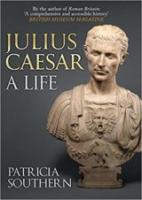
Amberley (2018) h/b 320pp £20 (ISBN 9781445650456)
S. is a prolific writer on many aspects of Roman history and its leading personalities. She has a comprehensive mastery of the ancient writers and their prejudices and a firm grasp on the issues engaging modern scholarship. This well produced and presented life of Julius Caesar, with copious reference to sources, a bibliography and index, as well as 16 pages of illustration and maps, gives her the opportunity to display her knowledge and judgement to excellent effect.
Midway through the book she observes that ancient historians may face two alternative problems—in some cases a ‘dearth of information’, which can lead to ‘much speculation’ and padding the narrative ‘by describing contemporary circumstances and political history’; conversely, the problem can be the availability of too much details, which can expand the text and lead to imbalance.
S. avoids these pitfalls with great skill: her early chapters are not padding, but set out the background to Caesar’s life and career, by explaining for the benefit of non-specialists the theoretical workings and safeguards of the Roman constitution and the buffeting it had taken at the hands of Marius and Sulla. Her accounts of military campaigns are effective précis of prolix ancient accounts.
When she moves on to Caesar’s direct involvement in affairs of state and realpolitik, which time after time overruled not only the niceties but the fundaments of the constitution, she is brilliant at chronically the various manoeuvres by which the different individuals and interest groups sought to manipulate the political process to their own advantage. These ranged from using procedural points to block or delay discussion (the auspices are unfavourable) to electoral shenanigans and bribery, marriage alliances, secret deals, offers of compromise in the sure knowledge that they would be rejected, making key figures financially dependent, planting supporters in positions to veto opponents, contriving the electoral disqualification of rivals and even ‘fake news’ or, as S. puts it, ‘deliberate misinformation’, as, for example, when Pompey’s military strength in Italy was bolstered by spreading the rumour that Caesar’s soldiers would probably join him.
This is not a psychological study of Caesar, or anyone else. It is rather an account of the seeking for power and influence and the retaining of power and denying it to others. The gifts of character, organizational ability, man management, ruthlessness tempered with clemency, charm, subtlety, courage and, in measure, good fortune, which led to Caesar coming out on top, are left to emerge from the narrative.
Motive and intention may be discussed, but outcome is what interests S. Was Pompey deliberately seeking a civil war to dispose of his main rival for once and for all? S. simply notes, ‘History records only what Pompey did, not what he intended to do at any time.’ A cautious historian, S. uses the word ‘probably’ on many occasions, but it is an honest ‘probably’ and does not re-emerge a few pages later as a certainty on which to build a new theory.
On occasions S. will outline various interpretations of people’s actions, for example, Caesar’s role (if any) in the Catiline conspiracy and his subsequent argument against putting the conspirators to death without trial, or whether Antony’s offer of a crown to Caesar was a carefully staged event to give Caesar an opportunity of refusing it or perhaps to test the populace’s response with the possibility of proceeding. But typically, S. draws no firm conclusions, beyond telling us what the actual outcomes were.
All this adds up to being led through a tumultuous period of ancient history by an expert and extremely knowledgeable cicerone, whose great achievement is to help her readers access the facts and to let the facts speak for themselves.
Ray Morris
